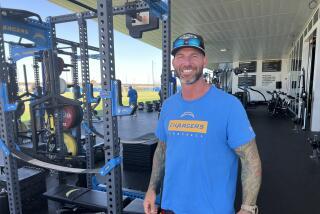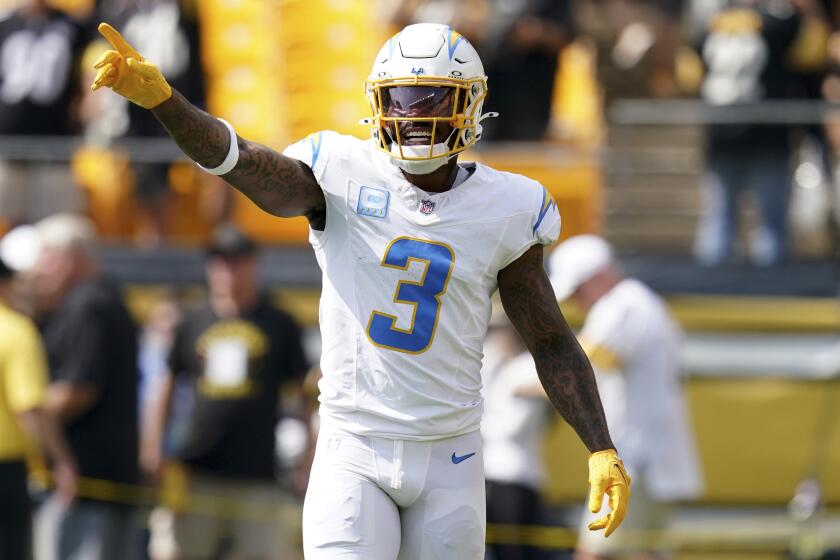Bodies So Powerful, Yet So Vulnerable
Nate Newton made us laugh. The more the old Cowboy lineman went on about how fat he was, the more we laughed. If William Perry, that moving blob of Bear meat, had been âThe Refrigerator,â it was right that Newton, the taller of the two men, should be âThe Kitchen.â At the 1993 Super Bowl, Newton made everyone laugh by reminding us of what it was, exactly, that made him rich, famous and worthy of quotation: âFatâs in, steroids are out.â
Steroids created a generation of NFL linemen with bodies remarkable in their lean and powerful lines. In return for those sculpted, defined bodies, the steroids received compensation in the form of sterility; liver, kidney and heart disease; skeletal disintegration and death at an early age.
Such a deal. As made by bedazzled players so young as to think themselves invincible, these deals with the devil were at best masochistic, at worst self-destructive. Yet they were understandable because players did only what they saw done. No such slack can be cut for the grown-ups.
Officials in the league and players union offices too long looked the other way. Their tolerance of steroids was criminal.
But Nate Newton, talking about fat, made us laugh. âFat is what got me in the league. All those pretty steroid boys, theyâre gone. Now itâs whoâs got the most jiggly.â The Cowboysâ media guide listed Newtonâs jiggly at 318 pounds, a number with such slight conformity to reality that it well may have been determined by subtracting his waist size from his weight.
As for dieting, Newton had little use for such niceties. âIâve been on starvation diets,â he said, âand I even thought about getting my jaw wired shut. But all I wouldâve done is put food in a blender and eaten, anyway.â
We laughed then.
But now?
In these sad days of football deaths, itâs long past time to ask the question we should have asked of Nate Newton.
Whatâs funny about being fat?
Football has replaced steroids with food. No longer allowed to bulk up through the magic of chemical potions, NFL players now transform themselves from large men to behemoths by eating 10,000-calorie meals. Fifteen years ago, there may have been 10 NFL players who weighed 300 pounds or more; last year, there were 275.
âThe NFL has become obsessed with big guys over 300 who can still run a 4.7 or 4.8 (40-yard dash),â the old Redskins lineman Joe Jacoby told The Washington Post. Once an All-Pro at 6-7 and 315 pounds, Jacoby now asks, âWhat have they done to their bodies to get that big, and what impact did that have? The athleteâs mentality is, if I can get bigger and still maintain my strength and speed, Iâll do it. But then you ask, whatâs the effect of all this massive weightlifting?â
One ventures to answer that question: The effect is to mask a killer. Gaining strength allows a Korey Stringer to carry weight he otherwise couldnât manage. Stringer was massive. At 6-4, he once weighed 388 pounds. This summer he was said to have reported to Vikings camp at 330.
Yet he went through the last practice session of his life so well in searing Minnesota heat that his position coach, Mike Tice, dismissed any thought that anyone should have thought Stringer was in distress. âHe did his blocks, he ran downfield, he was sharp,â Tice said.
He also had thrown up three times the day before, and on the last day of his life, as sharp as he may have been, Stringer ended the practice session by seeking refuge in a trainerFs air-conditioned trailer. He soon lost consciousness. Despite immediate efforts at a nearby hospital to cool his body--its temperature reached 108 degrees--Stringer died 15 hours later.
Heat stroke can kill anyone, lean or fat. But the obese person in athletic competition is at great peril because the fat around his torso acts as an insulator, refusing to allow the bodyâs heat to escape. In that heat, organs die. Imagine Korey Stringer wrapping his sumo wrestlerâs body in a parka and carrying out his downfield blocking sprints in 95-degree temperatures.
It makes no sense. Itâs a product of the Bear Bryant/Vince Lombardi macho culture that demands players prove their âtoughnessâ by passing physical tests that often mean little other than the playersâ willingness to bend to a coachâs order. Such tests can be a coachâs crutch; instead of the hard work of judging talent, character and dedication, a coach too often judges a player by how much pain he is willing to endure.
Football coaches once denied their players water at practice; now they give them water and deny them, implicitly if not directly, the right to say, âI donât want to weigh 350 pounds. Itâs killing me.â
As a matter of trial tactics, the famous lawyer Vincent Bugliosi believes the obvious never should be left unsaid. So this needs to be said about Korey Stringer: Had he worked in the real world as a doctor or lawyer, bus driver or sports writer, he would have been told to lose 100 pounds and lose it now, or else bad things would happen.
Trouble was, he didnât work in the real world.
He worked in Nate Newtonâs world.
More to Read
Go beyond the scoreboard
Get the latest on L.A.'s teams in the daily Sports Report newsletter.
You may occasionally receive promotional content from the Los Angeles Times.










